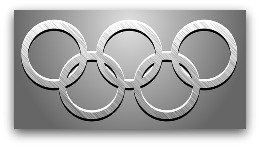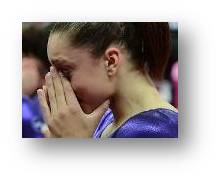The Olympics - and Happiness
February 2014

The Olympics raise some interesting questions about happiness - both for the athletes who compete and for those of us who watch as "spectators".
Think about it...
The Olympic Athletes and Happiness
From the perspective of the athletes, these amazing people who make it to the Olympics have spent most of their lives
focused on their primary goal of getting to this event, which for many
is a once-in-a-lifetime opportunity.
Just getting there is an incredible accomplishment – and all of these athletes are surely happy
just to be there.
But, many of these athletes have higher goals and
expectations than just to be there. Many are there, not only to
compete, but to win! So, from an “emotional” perspective, it can get
much more complicated than just being happy to participate.
As just mentioned, those who get there have likely devoted most of their lives to their goal. They have spent many, many hours every single day dedicated to their mission, invariably enduring significant pain and sacrifice due to the nature of their sport. Then, they get there and they have to compete with the best athletes in the world – and what if they fail to win a gold medal (first place), or even win a medal at all? Can this effect their overall happiness negatively?
  |
Take Jordyn Wieber, the World Champion American gymnast, who made it to the 2012 Summer Olympics and was expected to win a gold medal, but then failed to even advance to the finals, and was, therefore, eliminated completely from the possibility of a medal. What a disappointment! She was in tears, and obviously very upset. She was one of the favorites to win gold and now she had no chance to win at all. One announcer said “this will surely live with her forever” – perhaps as a regret or possibly even a lifelong negative memory. |
|
Get a FREE autographed copy of my book |
 |
Similarly, there are some athletes who are
upset, angry and perhaps "unhappy" if they “fail” to win a gold medal (they consider winning a
silver medal - second place - as a failure) while there are
those many athletes who are ecstatic to "just" win a bronze medal (or even just to be there, without winning a medal at all).
As I said, it gets complicated. Part of it has to do with expectations. If you are one of the best in the world and “expect” to win a gold medal, and then only
get silver, you could view it as a failure, and be unhappy about it.
We saw several silver medal winners in tears (of unhappiness) because
they viewed the outcome as a “failure”. But if you are just happy (grateful) to be
there and don't even expect to win a medal, but end up coming in 3rd
(winning the bronze medal), what a success!! (we also saw many bronze
medal winners in tears of happiness).
| Conterfactual Thinking: Why a Bronze Medal May Be Better for Happiness Than a Silver Medal: One of the "Happiness Facts" above indicates that research shows that Olympic bronze medal winners (3rd place) are happier than silver medal winners (2nd place). How can this be? It relates to this term, counterfactual thinking, which is the phenomenon of "what if" reasoning. In order to understand our world and our choices, we often imagine how things could have been different. The divorcee may ask, "would I be happier today if only I had married someone else." Likewise, a floundering student may ponder, "if only I had chosen another major, maybe I would have a better shot at getting into graduate school." In short, counterfactual thinking allows us to mentally simulate alternatives to our current reality in order to understand what features were most causal in bringing about the current outcome. With respect to the Olympics, the "what ifs" facing the contestants are starkly different. Clearly, the only "what ifs" for the gold medalist involve not being #1 -- thus, any counterfactualizing makes this athlete realize how fortunate she or he is. For the bronze medalist (the person who comes in 3rd), the most salient "what if" involves not being on the podium at all, again producing relatively positive feelings. However, for the silver medalist, the "what ifs" can easily make the athlete ponder how things could have been different in order to have won the gold medal (e.g., what if I practiced harder, what if I had not made the small error in my routine, what if a particular judge was of a different nationality). Thus, the "what ifs" that come to mind for the 1st and 3rd place finishers are positive, but 2nd place finishers have a number of dissatisfying alternatives to reality that can make them feel less happy in a moment of considerable triumph. Simply put, the silver medalist compares him or herself to the gold medal winner (and feels some degree of negative emotions), but the bronze medal winner compares him or herself to those people who did not win a medal (and feels grateful to have done so well). |
Well, it gets even more complicated than that, because this doesn't mean we should lower our expectations...
The other part of the issue relates to achieving our goals, which should be set high. Many people don't even set goals, and for those who do, many never achieve those goals.

Take Michael Phelps, the U.S.
champion swimmer, who has won more Olympic medals than any athlete in
history. He has 22 Olympic medals, 18 of which are gold. Amazing! He
is the most successful Olympic athlete of all time. But he would likely
never have achieved this result if he didn't have very difficult goals
and high expectations for success. Yes, goals are critical to success –
and even possibly to maximum happiness in life.
So now the big question (to make things even more complicated). Is Michael Phelps happy?
The answer: first, it depends ... and second, time will tell.
This two-fold answer relates to one of the most important first steps in my “Formula” for achieving total happiness in life – which is our own personal Definition of Happiness.
Michael Phelps, just like all of us, must have his own Definition of Happiness
well thought out. Almost surely, just the fact that he has won all
those medals – and obviously achieved many of his goals - does not
guarantee happiness. No one thing in life does. Money doesn’t. Great
relationships don't. Perfect health doesn't. And, winning more Olympic
medals than anyone else doesn’t.
It takes a carefully considered overall Definition of Happiness for our entire life which we must each assess for ourselves, just to have the opportunity to be totally happy.
Yes, just the opportunity.
That's
because once we have our definition, we must also have a plan to make
sure we make that definition a reality for ourselves throughout our
lives. And, everyone’s definition is different. Furthermore, even
though most people think they know what would make them happy in life
(in other words, they think they know their definition of happiness)
most don’t really know it.
There are countless examples of famous
people who thought a certain level of wealth, fame, and/or success
would equate to life happiness. Michael Jackson, John Bellushi, Whitney
Houston, and Junior Seau (the former pro football star who committed suicide in 2013) are a few examples. All died young due, at least
partly, to the inner struggles they faced and, I believe, some degree of
unhappiness – even though they seemed to “have it all”.
If these people had thought through their own personal Definition of Happiness
early on in their lives, and created a plan to achieve that definition
for themselves, they would most likely still be with us today. Not only
that, they would have been happier, more balanced, and more fulfilled
people – probably with even greater success and wealth than they
experienced in their careers.
What Can We Learn from This? How Does this Relate to Our Happiness?
Everything discussed so far relates to the happiness of the Olympic athletes - those goal-oriented, committed, passionate people who do whatever it takes to be the best in the world.
How, though, does that relate to our happiness - most of us being "spectators"?
Well, there are many components to the answer to that question.
As I write this piece on Olympic Happiness, it's February 2014, and the Winter Olympics in Sochi, Russia, just started.
I love to watch as much as possible. Even as I write this article, I have two TV's playing different channels and my iPad is on yet another Olympic channel. I know, I know, that's a bit weird - or at least somewhat excessive, but it makes one part of the point here.
That point is that, to me, the Olympics are incredibly inspiring. It inspires me to set higher goals. It inspires me to follow my passions. It inspires me to help teach my little girls to strive for excellence. It inspires me to live life to the fullest.
Maybe you can relate.

In many cases, the Olympics also makes me feel grateful. In the 2010 Olympics in Vancouver, Canada, for example, some friends and I went to Vancouver for several days (that's me on the left with three of my best buddies in the world).
My wife and I lived in Vancouver from 2001-2008 and loved it. We feel very grateful for the experience.
If you watched the 2010 Olympics, though, you may remember that one of the athletes was killed in the luge event. It was very tragic. I stood right next to the pole where the crash (and his death) occurred. It was very emotional.
And, gratitude for me comes on many levels from this experience. There's gratitude for being there, of course. There's gratitude for just being alive. There's even a sense of gratitude for the fallen athlete, who teaches us to live life to the fullest - since you never know what's going to happen next. And, as much of a stretch as it may be, there is even some sense of gratitude in knowing that he died doing something he loved - which is something we should all do (not die, but to do what you love).
So, going back to how this can all help us be happier, it really relates to what I call "The Happiness Formula".
This is a simple happiness-building concept which can help anyone be happier in life.
So, if you want to be happier,check out my free Happiness Formula Video Course by clicking here. It's a simple 5-module course that can make your life better within a week.
In addition to the video course, you can also go through this website to get just about anything you want to be happier - products, books, newsletter, and coaching.
As related to the Olympics, do you have your life goals written down? Do you have specific expectations for the future, especially as related to your Definition of Happiness and your life’s goals? Click here to learn more about goal setting and how to achieve all your goals.
And certainly, if you get inspired by watching the best people in the world compete - people who have committed themselves to being the best at something they love - make sure to watch the Olympics every two years. It's a wonderful happiness-building experience.
BeHappy! my friends
PLEASE CONSIDER...
If the information on this site helps you and you'd like to make a donation to BeHappy101.com (to help make others happy), please click on the button below to make a contribution. The amount you donate is entirely up to you. A portion will used to contribute to the happiness of others and is greatly appreciated. [WHY DONATE?] |











 I'm Jimmy, the founder and creator of this site and the whole BeHappy! system. My life's purpose is to be a positive, creative force for health and happiness and through this website, my books, coaching, and happiness-building programs, I intend to help as many people as possible live their happiest possible lives.
I'm Jimmy, the founder and creator of this site and the whole BeHappy! system. My life's purpose is to be a positive, creative force for health and happiness and through this website, my books, coaching, and happiness-building programs, I intend to help as many people as possible live their happiest possible lives.